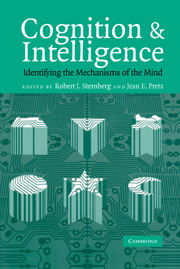Book contents
- Frontmatter
- Contents
- Preface
- 1 Information Processing and Intelligence: Where We Are and Where We Are Going
- 2 Mental Chronometry and the Unification of Differential Psychology
- 3 Reductionism versus Charting: Ways of Examining the Role of Lower-Order Cognitive Processes in Intelligence
- 4 Basic Information Processing and the Psychophysiology of Intelligence
- 5 The Neural Bases of Intelligence: A Perspective Based on Functional Neuroimaging
- 6 The Role of Working Memory in Higher-Level Cognition: Domain-Specific versus Domain-General Perspectives
- 7 Higher-Order Cognition and Intelligence
- 8 Ability Determinants of Individual Differences in Skilled Performance
- 9 Complex Problem Solving and Intelligence: Empirical Relation and Causal Direction
- 10 Intelligence as Smart Heuristics
- 11 The Role of Transferable Knowledge in Intelligence
- 12 Reasoning Abilities
- 13 Measuring Human Intelligence with Artificial Intelligence: Adaptive Item Generation
- 14 Marrying Intelligence and Cognition: A Developmental View
- 15 From Description to Explanation in Cognitive Aging
- 16 Unifying the Field: Cognition and Intelligence
- Author Index
- Subject Index
- References
2 - Mental Chronometry and the Unification of Differential Psychology
Published online by Cambridge University Press: 23 November 2009
- Frontmatter
- Contents
- Preface
- 1 Information Processing and Intelligence: Where We Are and Where We Are Going
- 2 Mental Chronometry and the Unification of Differential Psychology
- 3 Reductionism versus Charting: Ways of Examining the Role of Lower-Order Cognitive Processes in Intelligence
- 4 Basic Information Processing and the Psychophysiology of Intelligence
- 5 The Neural Bases of Intelligence: A Perspective Based on Functional Neuroimaging
- 6 The Role of Working Memory in Higher-Level Cognition: Domain-Specific versus Domain-General Perspectives
- 7 Higher-Order Cognition and Intelligence
- 8 Ability Determinants of Individual Differences in Skilled Performance
- 9 Complex Problem Solving and Intelligence: Empirical Relation and Causal Direction
- 10 Intelligence as Smart Heuristics
- 11 The Role of Transferable Knowledge in Intelligence
- 12 Reasoning Abilities
- 13 Measuring Human Intelligence with Artificial Intelligence: Adaptive Item Generation
- 14 Marrying Intelligence and Cognition: A Developmental View
- 15 From Description to Explanation in Cognitive Aging
- 16 Unifying the Field: Cognition and Intelligence
- Author Index
- Subject Index
- References
Summary
Mental chronometry is the measurement of cognitive speed. It is the actual time taken to process information of different types and degrees of complexity. The basic measurements are an individual's response time (RT) to a visual or auditory stimulus that calls for a particular response, choice, or decision.
Since at least the time of Sir Francis Galton (1822–1911), the father of differential psychology, it has been hypothesized by him and many others that mental speed is a major aspect of general intelligence. What we now know for sure is that RT can be a highly precise, reliable, and sensitive measure of individual differences. Its relationship to other psychological and ecological variables, however, is a complex affair just recently being explored.
Research on RT has a venerable history. Not only was it the earliest measurement technique used in empirical psychology, but also its scientific use as a measure of individual differences preceded the beginning of experimental psychology by at least half a century. The first published research on RT appeared in astronomy journals. Time, as measured by the earth's rotation with reference to a star's moment of transit across a hairline in the lens of a telescope, had to be measured as accurately as possible. In 1796 it was accidentally discovered by the Astronomer Royal at the Greenwich Observatory that astronomers showed individual differences in RT to the star's transit across the hairline.
Information
- Type
- Chapter
- Information
- Cognition and IntelligenceIdentifying the Mechanisms of the Mind, pp. 26 - 50Publisher: Cambridge University PressPrint publication year: 2004
References
Accessibility standard: Unknown
- 6
- Cited by
